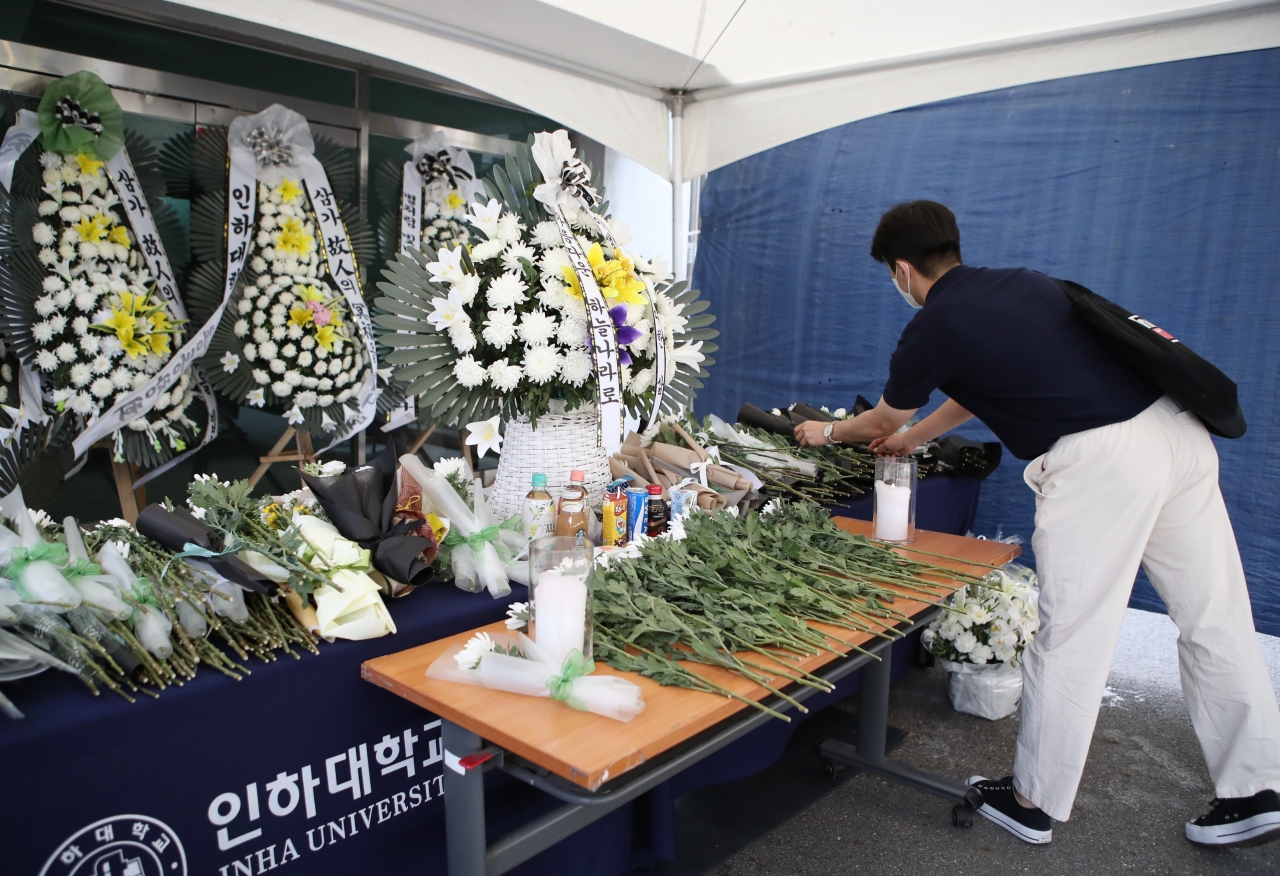Is Korea soft on crime?
News of heinous crimes spark calls for end to ‘lenient’ punishment of criminals, but some experts warn against ‘punishment populism’
By Yoon Min-sikPublished : July 28, 2022 - 18:07
On July 15, a female college freshman was found dead on a college campus, naked. The suspect -- a male freshman at the same Inha University -- faces charges of raping the woman and causing her death.
His attack on the woman, in which he drank with her, took advantage of her heavily intoxicated condition, filmed his actions and left her to die after she somehow fell from the third floor of a building, has ignited public anger.
That the crime he is charged with -- quasi-rape causing death -- is typically punished with 11 to 14 years in prison, with possibilities for a term reduction and a parole later -- stoked familiar questions: Are violent criminals being punished enough?
His attack on the woman, in which he drank with her, took advantage of her heavily intoxicated condition, filmed his actions and left her to die after she somehow fell from the third floor of a building, has ignited public anger.
That the crime he is charged with -- quasi-rape causing death -- is typically punished with 11 to 14 years in prison, with possibilities for a term reduction and a parole later -- stoked familiar questions: Are violent criminals being punished enough?

Is Korea too lenient?
A similar controversy rose last summer when a man in his 20s sexually assaulted two middle-school girls and raped another, but was given a suspended prison term by Daejeon court. This means the man walked free after one count of rape and two counts of sexual molestation, all against minors.
In its ruling, the court said it took into consideration that the suspect did not inflict serious damage on the victims, that he had no criminal record at the time, that he reached a settlement with the victims, and that he submitted 75 letters of apology during trial.
The law states that such violence is subject to at least five years in prison, and the Sentencing Commission guidelines recommend at least three to five years in prison. After public outcry following the initial ruling, the appellate court last week sentenced him to five years in prison.
After facing criticism for light punishment against sex offenders, South Korea has made efforts to raise the level of punishment. In 2020, it revised a law to allow harsher punishment for sexual violence related to illegal filming.
But, is Korea sternly punishing criminals? Data tells a different story.
Last year, the Korean Women’s Development Institute and the Sentencing Commission held a joint forum on punitive actions against gender-related crimes, during which it was revealed 59.1 percent of all sex crime convictions resulted in suspended jail terms in 2019, up from 46.3 percent in 2010.
In convictions that carried jail time, the average length of the term was 45.2 months in 2019, down from 61 months in 2015.
Park Bok-soon, a senior researcher for the KWDI said that the “light punishment” for sex crimes may be due to the court focusing more on factors that reduce terms, along with lack of gender-sensitivity from judicators.
In 2020, Cho Doo-soon, who raped an 8-year-old girl in 2008, inflicting serious injuries, was released back to the Korean society. Such violence against a child can receive up to a lifetime in prison, but his term was reduced to 12 years on his claims that he was not of sound mind due to alcoholism.
Citizens petitioned for a retrial, but to no avail, as Cho was released in December of that year.
As in the Inha University case, a lack of evidence of criminal intent to kill often stops authorities from making the murder charge stick. This is why the ongoing trial of another high-profile case involving a wife accused of causing the drowning of her husband holds significance.
The suspect Lee Eun-hae and her accomplice Cho Hyun-soo have been charged with murder, which, if convicted, will mark the first time the court recognizes that an indirect killing via psychological domination is murder.
Extreme cases like Cho and Lee have led to the public calling for harsher punishments and for more criminals to have their personal information made public.
Since 2010, the country has revealed personal information of violent criminals, including the face, name, age of a suspect on specific violent crimes, which “has been committed in a cruel way and has brought material damage.”
Last year, the National Police Agency disclosed the personal information of 10 criminals, the highest number since the law took effect. Police said this was due to high public demand, adding that there have been around 1,500 related petitions since 2017.

But while harsher sentences may assuage the victims’ need for justice, there is no substantial evidence backing up another argument for harsher punishments: That they can help reduce crimes.
Would harsher punishments stop crime?
In recent debate about whether death penalty is constitutional, its opponents have pointed to research that claim capital punishment has no deterrent effect.
“Does the death penalty save lives” published on the Criminology & Public Policy, analyzed data from 1977 to 2006 and found long-term risks rarely factor in the criminals’ decision-making process. Simply put, most offenders just do not think about the possibility of getting caught.
Kim Dae-geun, a senior researcher at the state-run Korea Institute of Criminology and Justice who talked with 33 death row inmates, said that none of his interviewees even considered punishment before committing crime.
Experts point out that simply enforcing heavier penalties on criminals is not enough to reduce serious crime.
Lee In-young, professor of law at Hongik University, said in her paper that South Korea has been raising the level of punitive actions based on the public’s demand for strong measures against violent crimes, calling it “punishment populism.”
She found no significant correlation between crime rates and raising punishment levels, even in the section from 2010 to 2014 when the average sentences for murder, robber and sex crimes were on the rise.
“Crime deterrence is not achieved simply via strengthening punishments or imposing heavy penalty,” Lee wrote, pointing that that revising the system should not be considered an easy way out to soothe the public anxiety. The focus should be on criminal policies that can prevent crimes, rather than on punishment after it already happened, she claimed.
Choi Jeong-hak, a law professor at the Korea National Open University, also discussed the trend of harsher punishments in his paper and pointed out excessive execution of punitive actions can be linked to cruel control of minorities.
“This is not to say we should be more lenient toward crimes. But an overly emotional reaction to certain crimes eventually leads to an ‘inefficient law that can only be applied in a few, specific cases,” Choi wrote.
By Yoon Min-sik
(minsikyoon@heraldcorp.com)



















![[Today’s K-pop] Treasure to publish magazine for debut anniversary](http://res.heraldm.com/phpwas/restmb_idxmake.php?idx=642&simg=/content/image/2024/07/26/20240726050551_0.jpg&u=)